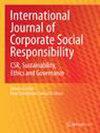Understanding corporate social responsibility
International Journal of Corporate Social Responsibility
Pub Date : 2019-03-04
DOI:10.4324/9780429294273-1
引用次数: 5
Abstract
This study explores the phenomenon of Corporate Social Responsibility (CSR) among micro businesses in Jelutong wet market in Penang, Malaysia. For this qualitative case study, three (3) data gathering instruments are employed namely non-participant observations, semi-structured interviews and participant observations. Over a period of three (3) months, fifteen (15) non-participant observations, thirty-five (35) semi-structured interviews and ten (10) participant observations were conducted. The findings show that current literature on CSR is inadequate to capture and understand CSR in the context of micro businesses in a wet market. Instead, Social Capital Theory from the discipline of sociology is found to be a more suitable theoretical framework as it uses the individual as the unit of analysis. Subsequently, both CSR and Social Capital are deconstructed and analysed revealing their innate relationship. From these findings, conclusions and public policy recommendations are derived.了解企业社会责任
本研究旨在探讨马来西亚槟城杰路通菜市场微型企业的企业社会责任现象。在这个定性案例研究中,采用了三(3)种数据收集工具,即非参与性观察、半结构化访谈和参与性观察。在三(3)个月的时间里,进行了十五(15)次非参与性观察,三十五(35)次半结构化访谈和十(10)次参与性观察。研究结果表明,目前关于企业社会责任的文献不足以捕捉和理解湿市场微企业背景下的企业社会责任。相反,来自社会学学科的社会资本理论被认为是一个更合适的理论框架,因为它使用个人作为分析单位。随后,对企业社会责任和社会资本进行了解构和分析,揭示了两者的内在关系。从这些发现中得出结论和公共政策建议。
本文章由计算机程序翻译,如有差异,请以英文原文为准。
求助全文
约1分钟内获得全文
求助全文

 求助内容:
求助内容: 应助结果提醒方式:
应助结果提醒方式:


